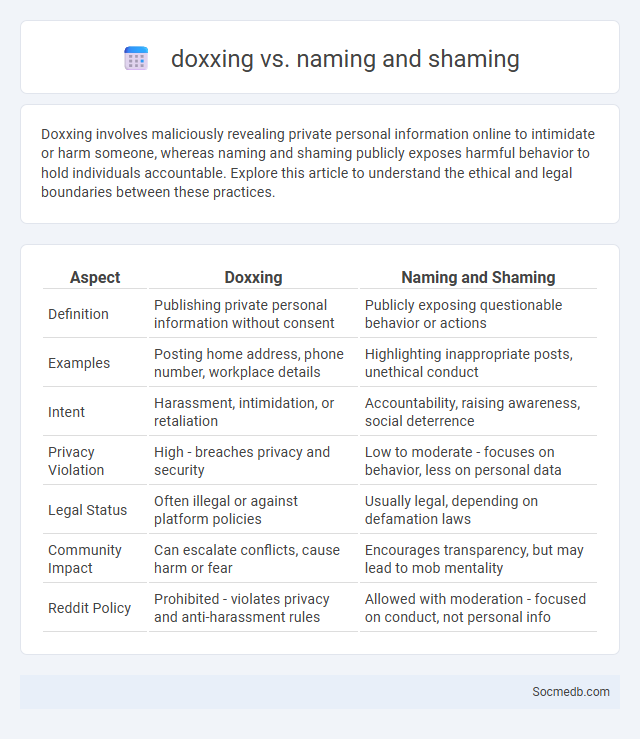
Photo illustration: doxxing vs naming and shaming
Doxxing involves maliciously revealing private personal information online to intimidate or harm someone, whereas naming and shaming publicly exposes harmful behavior to hold individuals accountable. Explore this article to understand the ethical and legal boundaries between these practices.
Table of Comparison
| Aspect | Doxxing | Naming and Shaming |
|---|---|---|
| Definition | Publishing private personal information without consent | Publicly exposing questionable behavior or actions |
| Examples | Posting home address, phone number, workplace details | Highlighting inappropriate posts, unethical conduct |
| Intent | Harassment, intimidation, or retaliation | Accountability, raising awareness, social deterrence |
| Privacy Violation | High - breaches privacy and security | Low to moderate - focuses on behavior, less on personal data |
| Legal Status | Often illegal or against platform policies | Usually legal, depending on defamation laws |
| Community Impact | Can escalate conflicts, cause harm or fear | Encourages transparency, but may lead to mob mentality |
| Reddit Policy | Prohibited - violates privacy and anti-harassment rules | Allowed with moderation - focused on conduct, not personal info |
Understanding Doxxing: Definition and Origins
Doxxing refers to the malicious act of publicly revealing private or identifying information about an individual without their consent, often to intimidate or harass. Originating from the early internet practice of "dropping docs," it evolved as a tool for exposing personal data online. To protect Your privacy, understanding how doxxing operates on social media platforms is crucial in mitigating its risks.
What is Naming and Shaming?
Naming and shaming on social media involves publicly identifying individuals or organizations accused of unethical or illegal behavior to hold them accountable. This practice leverages the platform's vast audience to apply social pressure, often leading to reputational damage or corrective actions. Your awareness of naming and shaming is crucial to understanding how digital exposure can influence social justice and online behavior.
Personal Information Doxxing Explained
Personal information doxxing involves the unauthorized sharing of your private data, such as home address, phone number, or workplace, on social media platforms, often leading to harassment or identity theft. It exploits publicly visible details or hacked accounts to expose sensitive information for malicious purposes. Protecting your online privacy includes adjusting security settings, limiting data sharing, and being cautious about the information you post or allow others to tag.
Key Differences: Doxxing vs Naming and Shaming
Doxxing involves maliciously publishing private or identifying information about an individual without consent, often leading to harassment or threats. Naming and shaming refers to publicly exposing someone's behavior or actions, typically related to ethical or social misconduct, aiming to hold them accountable or provoke social consequences. The key difference lies in intent and content: doxxing targets personal data violation, while naming and shaming targets behavior and accountability on social media platforms.
Motivations Behind Doxxing and Naming and Shaming
Doxxing and naming and shaming on social media often stem from motivations such as seeking justice, exposing wrongdoing, or holding individuals accountable for harmful actions. These practices can also be driven by a desire for retaliation, social validation, or to influence public opinion by revealing private information. Understanding these motivations helps Your awareness of the ethical and legal implications involved in digital interactions.
Legal Implications and Risks
Social media platforms expose users to significant legal implications and risks, including defamation, intellectual property violations, and privacy breaches. Unauthorized sharing of copyrighted content or personal data can result in lawsuits, fines, and damage to Your reputation. Understanding platform policies and national regulations helps mitigate these risks and ensures responsible online engagement.
Ethical Considerations in Online Exposure
Your online exposure on social media involves critical ethical considerations, including respecting privacy, avoiding the spread of misinformation, and maintaining digital consent when sharing content involving others. Transparency about the origins of shared information and accountability for posts ensure a trustworthy digital environment. Emphasizing empathy and responsibility helps safeguard both personal reputation and the well-being of your online community.
Real-World Examples and Case Studies
Brands like Nike have leveraged social media campaigns on Instagram and Twitter to boost engagement, achieving a reported 15% increase in sales during targeted promotions. Case studies from Buffer reveal that consistent content posting and audience interaction on Facebook and LinkedIn improve organic reach by up to 60%. Analyzing data from HubSpot, companies employing influencer partnerships on platforms like TikTok experience a 30% higher conversion rate compared to traditional advertising methods.
Preventing and Protecting Against Doxxing
Securing your social media profiles involves adjusting privacy settings to limit the visibility of personal information, reducing the risk of doxxing. You should avoid sharing sensitive details such as your home address, phone number, or workplace publicly to prevent malicious actors from gathering data. Using strong, unique passwords and enabling two-factor authentication further protects your accounts from unauthorized access.
Best Practices for Responsible Online Behavior
Maintaining respectful communication and verifying information before sharing help reduce misinformation and promote a positive online environment. Protecting your privacy by using strong passwords and adjusting security settings minimizes the risk of data breaches. Your responsible online behavior fosters trust and safety across social media platforms.
 socmedb.com
socmedb.com